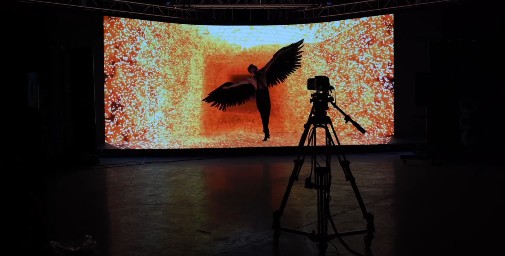A new facility in Wakefield will help drive the next generation of production technologies to revolutionise the UK’s film, TV and performing arts industries.
The state-of-the-art lab is part of the Creative Industries Sector Vision, which sets out the Government’s ambition to maximise the potential of the UK’s creative industries so they generate an extra £50 billion for the economy and support a million more jobs by 2030.
A consortium, led by the University of York, has been selected by the UK Government to host one of four new labs specialising in the future of virtual production – a range of techniques that use computer-generated imagery (CGI), hyper-real sound, augmented reality and motion capture to create virtual sets and environments.
Lab Director, Professor Gavin Kearney from the School of Physics Engineering and Technology at the University of York, said: “We are thrilled to announce our new lab facility; it will build upon the University’s world-leading applied research for the creative industries, as well as the support and growth initiatives of Screen Yorkshire and XR Stories in the screen industries sector across our region.”
Virtual production allows filmmakers and theatre directors to create large-scale digitally-generated environments that performers can interact with in real-time using LED panels, as a faster and less expensive alternative to green screens. The technology has been used to great success in the ABBA Voyage live concert at the Queen Elizabeth Olympic Park in London and on Disney’s hit show The Mandalorian.
Located alongside studios and leading entertainment technology companies at Production Park in Wakefield, the lab will bring together expertise from the University of York, Vodafone, Screen Yorkshire, and support from Wakefield Council and the York and North Yorkshire Local Enterprise Partnership.
The lab will focus on applying new virtual production technology to live events and how the latest developments can be used to ensure the UK has the skills and infrastructure to stay on the cutting edge of this type of technology.
The lab is part of UKRI’s Convergent Screen Technologies and performance in Realtime (CoSTAR) programme, supported by £75.6 million of government funding and £63 million of new industry investment, which will form the largest virtual production research and development network in Europe, with four facilities across the country.
Culture Secretary Lucy Frazer said: “Yorkshire has a rich history in film, TV and the performing arts, home to unforgettable scenery and highly skilled creatives behind popular productions including The Duke, All Creatures Great and Small and Happy Valley.
“Now we’re putting West Yorkshire at the forefront of future technology for the next generation of filming and live events. Together with experts across the UK, this new lab will make sure the UK stays ahead of the latest developments transforming our screens and stages.”
The network will include a national lab at Pinewood Studios, and a new Insight and Foresight Unit led by Goldsmiths and the British Film Institute. Three regional hubs, in Dundee, Yorkshire and Belfast, are expected to contribute a combined £33 million to the economy and support 423 jobs. Partners involved across the programme include the National Film and Television School, BT and BBC Northern Ireland as well as Royal Holloway, Ulster and Abertay universities.
Film and TV productions in Yorkshire boosted the local economy by more than £235 million in 2019 and the region has provided backdrop for some of this year’s biggest blockbusters, including Mission:Impossible 7 and the latest Indiana Jones film (Indiana Jones and the Dial of Destiny).



